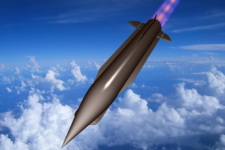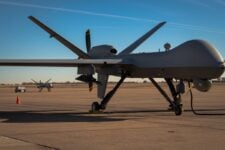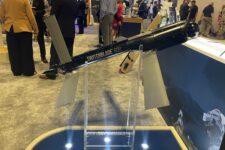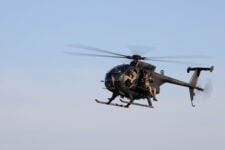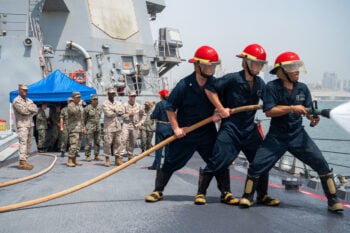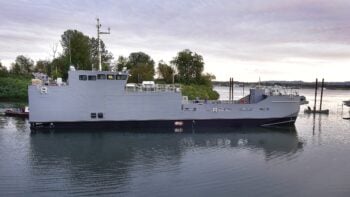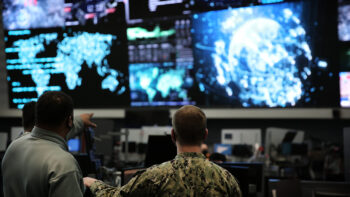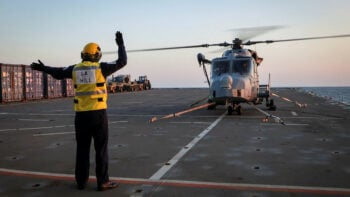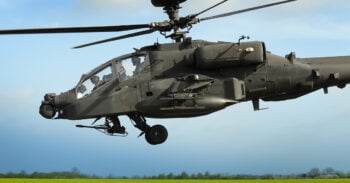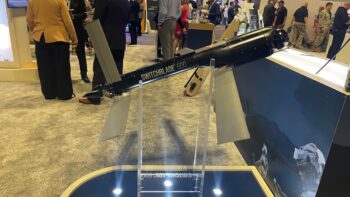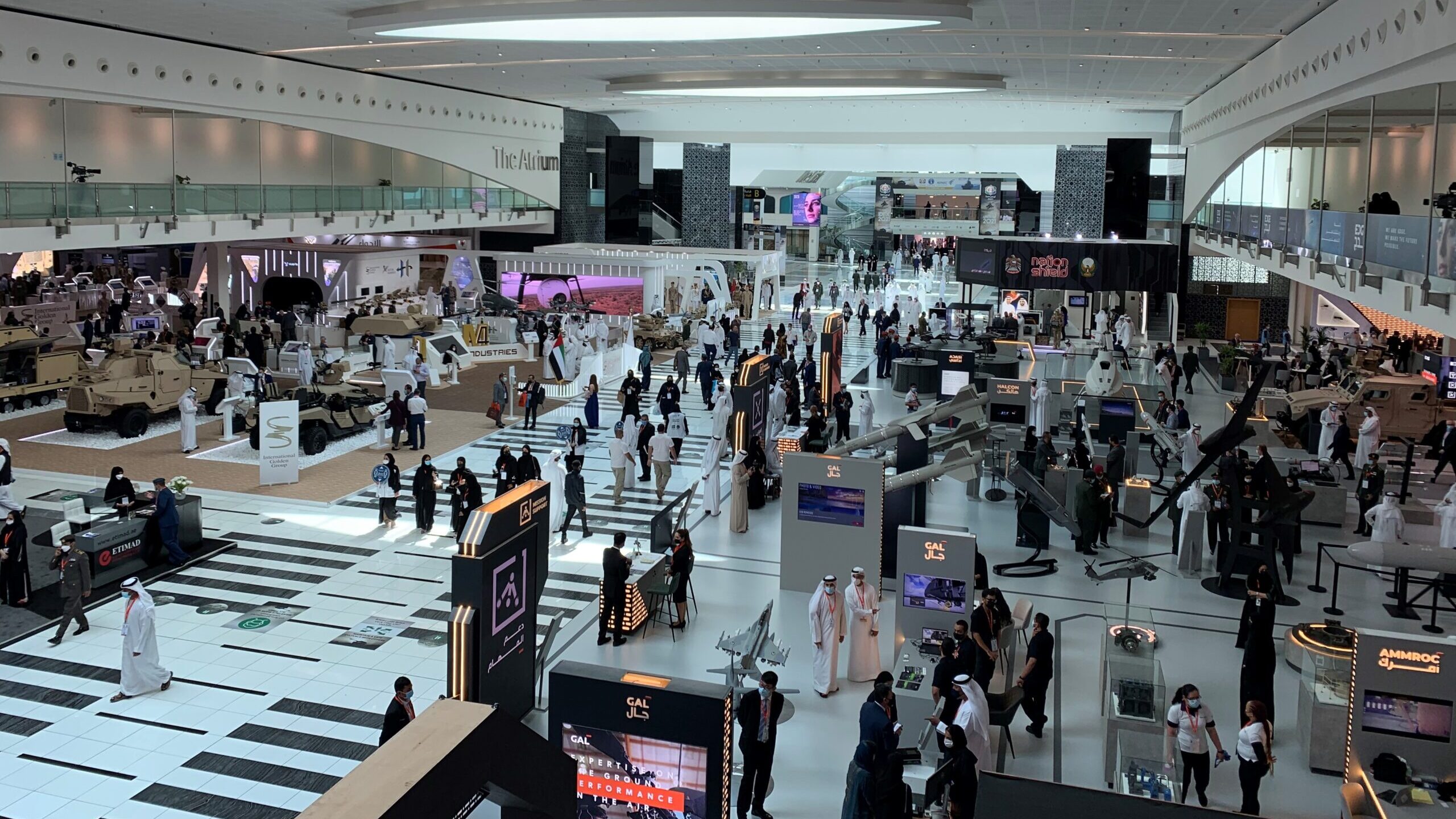
The show floor at the 2021 IDEX show in Abu Dhabi, UAE. (Chyrine Mezher/Breaking Defense)
DUBAI — Over the last four years there has been a clear shift in the Gulf towards buying non-American major defense articles. But regional defense experts do not believe there is a coordinated policy of shifting away from US defense companies —those goods remain at the top of many regional wish-lists, and if the US chose to move quickly would find willing buyers.
But the combination of new players to the market, the growing trend of investing in domestic defense industries and, most importantly, political squabbles, means the dominance of US defense primes in the region may be rockier moving forward than in the past.
“There are many reasons that would compel Arab countries to switch from US weapons to European or other sources, and most important of them are the cheaper and more competitive prices, and the desire by the regional military forces to diversify their weapons’ sources, and the political position of the US government that sometimes complicate the sale of defense systems and pushes the buyer to another market,” said retired Maj. Gen. Abdullah Syed Al Hashimi, former assistant undersecretary at the UAE Ministry of Defense.
To be clear, the US still does plenty of business in the region. According to the Stockholm International Peace Institute (SIPRI), between 2018 and 2022 Saudi Arabia accounted for 19 percent of US arms exports, Qatar 6.7 percent, Kuwait 4.8 percent and the United Arab Emirates (UAE) 4.4 percent.
Yet anecdotally, three US defense industry sources based in the Arabian Gulf region told Breaking Defense, it feels like non-US companies are winning more major defense programs regionally. One source who asked not to be named particularly pointed to Saudi Arabia as a buyer who is actively looking to diversify away from the US.
A review of major defense programs signed by the Saudi Arabia and the UAE since 2019, does show that the European companies are increasing their share in the region.
The Spanish shipbuilder Navantia signed an MOU last December to build multi-mission warships to the Saudi Navy. The French already got their foot in the door by securing a chunk of the Saudi Navy program through signing an agreement to collaborate with local Saudi companies in building frigates and corvettes. The French Naval Group is already building Gowind corvettes to the UAE Navy that were purchased in a deal signed in 2019.
Meanwhile, the growing export power of South Korea is finding a foothold in the region. In March 2022 Saudi Arabia signed a near $1 billion deal with South Korea to purchase weapons and systems, including the M-SAM air defense system. The M-SAM was also purchased by the UAE in a deal announced a year earlier.
South Korea’s willingness to transfer technology was key for its success in penetrating the Gulf defense market, according to regional officials.
“The current trend is to localize the defense industry in the region and there will be more partnerships with international companies and further diversifications of the sources of the weapons to avoid dependency on one side,” said Albader Alshateri, professor at the National Defense University in the UAE.
Baharoon pointed out that “there will be greater reliance on domestic production and the relations with international companies will be based on the transfer of technology through partnerships with local defense companies.”
US Facing Challenges Of Own Making
Abdullah Ghanem Al Kahtani, a retired Saudi Air Force Maj. Gen. who now works as a defense analyst, pointed out that the US still has weapons that are desired in the region. The issue, he said, is one primarily of politics.
“It is not accurate to say that Saudi Arabia is replacing US defense companies with European ones and the proof is that all US companies are still invited to bid in tenders to fulfill the requirements of the Saudi Armed Forces,” he said. “The political stance of the US government is what usually undermines the defense deals between American companies and the Saudi Armed Forces.”
“US policies towards the Gulf states affect procurement programs. The US decision to pull out the Patriots from Saudi Arabia prompted Al Riyadh to purchase the South Korean air defense option, and the US decision to freeze the F-35 deal with the UAE led to the signing of the Rafale fighters’ contract with France,” agreed Mohammed Baharoon, the director general of the Dubai Public Policy Research Center.
One clear example of where this came into play: in December 2021, the UAE halted discussions with the US on a mega defense package that included F-35 jets and MQ-9B drones and standoff weapons after claiming the US government added new conditions to the terms of the sale. Around the same time, the UAE announced plans to purchase 80 Rafale jets from France in a $19 billion deal. (In February, a US official told Breaking Defense there was still hope the F-35 deal could be resuscitated.)
And yet, the counter example is also clear. The decision in late 2021 to pull US Patriot missiles out of Saudi Arabia while the Kingdom was subject to frequent ballistic missile attacks by Houthi militias in Yemen led to a grinding of teeth in Riyadh. But the missile defense systems remain of great interest to the regional countries. Saudi Arabia and the UAE are awaiting the final US approval on the sale of more Patriot and THAAD missiles to the two Gulf states.
The US defense industry source said that tough US export controls on the transfer of defense technology has made it hard for the American companies to close many deals in the region, which benefited the competition in Europe and Asia.
In other words: if the US were to loosen its export regulations or approve sales — perhaps as part of an offer to Saudi Arabia to create ties to Israel, reportedly a key foreign policy plank for US President Joe Biden heading into the 2024 presidential election — US companies could see yet another cash windfall in the region.
Iran A Non-Factor
In March, China brokered an agreement to normalize the relations between Saudi Arabia and Iran that brought about a lull in the regional proxy war between the two sides that are seeking to normalize relations. The UAE resumed diplomatic relations with Iran a year before.
But the three experts downplayed the idea that any rapprochement between the Gulf states and Iran is likely to impact US arms sales in the area.
Alshateri told Breaking Defense that “it is not yet clear whether this conciliatory mood in the region will become permanent. For now, the bets are off.”
RELATED: Devil in the details: How Saudi-Iranian détente will (or won’t) affect defense in the region
“The Chinese-brokered Iranian-Saudi agreement is at its start, and many steps need to be taken [by Iran] to end the conflict and become a lasting peace. But regardless of how the situation evolves, Saudi Arabia will not stop its ongoing defense programs,” Kahtani told Breaking Defense.
“The current period of stability produced by the Chinese-brokered deal is still being assessed by the governments of the region, and if the differences – including border disputes – are resolved with Iran then this will certainly impact defense spending” Baharoon told Breaking Defense.
TAI exec claims 20 Turkish KAAN fighters to be delivered in 2028
Temel Kotil, TAI’s general manager, claimed that the domestically-produced Turkish jet will outperform the F-35 Joint Strike Fighter.


